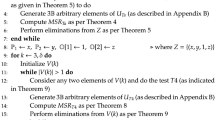Abstract
The coalition structure generation problem represents an active research area in multi-agent systems. A coalition structure is defined as a partition of the agents involved in a system into disjoint coalitions. The problem of finding the optimal coalition structure is NP-complete. In order to find the optimal solution in a combinatorial optimization problem it is theoretically possible to enumerate the solutions and evaluate each. But this approach is infeasible since the number of solutions often grows exponentially with the size of the problem. In this paper we present a greedy adaptive search procedure (GRASP) to efficiently search the space of coalition structures in order to find an optimal one.
Access this chapter
Tax calculation will be finalised at checkout
Purchases are for personal use only
Preview
Unable to display preview. Download preview PDF.
Similar content being viewed by others
References
Garey, M.R., Johnson, D.S.: Computers and Intractability: A Guide to the Theory of NP-Completeness. W. H. Freeman & Co., New York (1990)
Sandholm, T., Larson, K., Andersson, M., Shehory, O., Tohmé, F.: Coalition structure generation with worst case guarantees. Artificial Intelligence 111(1-2), 209–238 (1999)
Cramton, P., Shoham, Y., Steinberg, R. (eds.): Combinatorial Auctions. MIT Press, Cambridge (2006)
Hoos, H., Stützle, T.: Stochastic Local Search: Foundations & Applications. Morgan Kaufmann Publishers Inc., San Francisco (2004)
Feo, T.A., Resende, M.G.C.: Greedy randomized adaptive search procedures. Journal of Global Optimization 6, 109–133 (1995)
Rahwan, T., Jennings, N.R.: An improved dynamic programming algorithm for coalition structure generation. In: Prooceedings of AAMAS 2008, pp. 1417–1420 (2008)
Kahan, J.P., Rapoport, A.: Theories of Coalition Formation. Lawrence Erlbaum Associates Publisher, Mahwah (1984)
Yeh, D.Y.: A dynamic programming approach to the complete set partitioning problem. BIT 26(4), 467–474 (1986)
Rahwan, T., Ramchurn, S.D., Jennings, N.R., Giovannucci, A.: An anytime algorithm for optimal coalition structure generation. Journal of Artificial Intelligence Research 34(1), 521–567 (2009)
Sen, S., Dutta, P.S.: Searching for optimal coalition structures. In: Prooceedings of ICMAS 2000, pp. 287–292. IEEE Computer Society, Los Alamitos (2000)
Keinänen, H.: Simulated annealing for multi-agent coalition formation. In: Håkansson, A., Nguyen, N.T., Hartung, R.L., Howlett, R.J., Jain, L.C. (eds.) KES-AMSTA 2009. LNCS, vol. 5559, pp. 30–39. Springer, Heidelberg (2009)
Kirkpatrick, S., Gelatt Jr., C.D., Vecchi, M.P.: Optimization by simulated annealing. Science 220(4598), 671–680 (1983)
Mockus, J., Eddy, E., Mockus, A., Mockus, L., Reklaitis, G.V.: Bayesian Heuristic Approach to Discrete and Global Optimization. Kluwer Academic Publishers, Dordrecht (1997)
Milne, S.C.: Restricted growth functions, rank row matchings of partitions lattices, and q-stirling numbers. Advances in Mathemathics 43, 173–196 (1982)
Rahwan, T., Michalak, T., Jennings, N., Wooldridge, M., McBurney, P.: Coalition structure generation in multi-agent systems with positive and negative externalities. In: Proceedings of IJCAI 2009, pp. 257–263 (2009)
Dang, V.D., Jennings, N.R.: Coalition structure generation in task-based settings. In: Proceeding of ECAI 2006, pp. 210–214. IOS Press, Amsterdam (2006)
Author information
Authors and Affiliations
Editor information
Editors and Affiliations
Rights and permissions
Copyright information
© 2010 Springer-Verlag Berlin Heidelberg
About this paper
Cite this paper
Di Mauro, N., Basile, T.M.A., Ferilli, S., Esposito, F. (2010). Coalition Structure Generation with GRASP. In: Dicheva, D., Dochev, D. (eds) Artificial Intelligence: Methodology, Systems, and Applications. AIMSA 2010. Lecture Notes in Computer Science(), vol 6304. Springer, Berlin, Heidelberg. https://doi.org/10.1007/978-3-642-15431-7_12
Download citation
DOI: https://doi.org/10.1007/978-3-642-15431-7_12
Publisher Name: Springer, Berlin, Heidelberg
Print ISBN: 978-3-642-15430-0
Online ISBN: 978-3-642-15431-7
eBook Packages: Computer ScienceComputer Science (R0)




